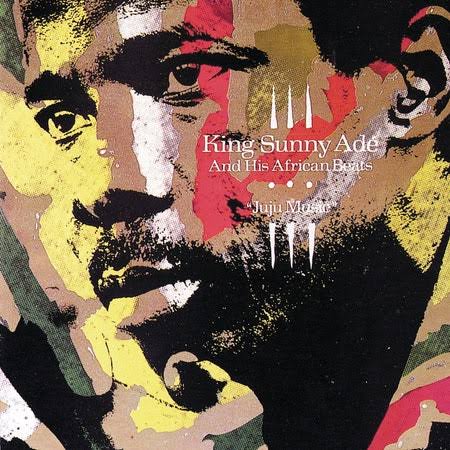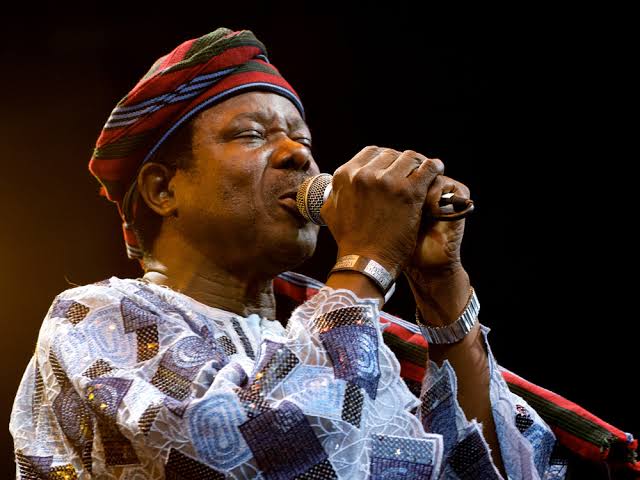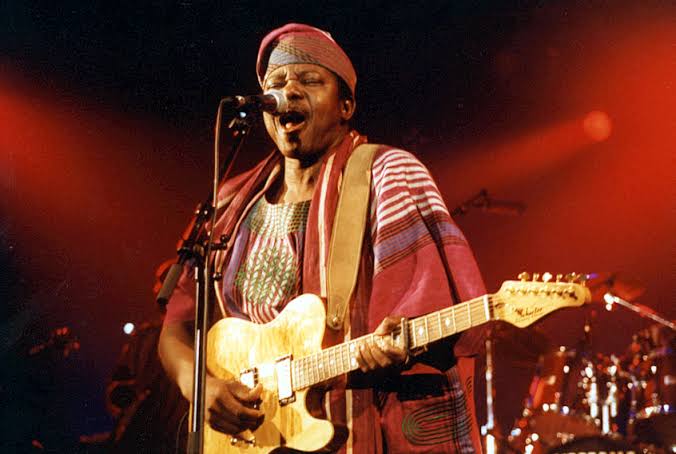King Sunny Adé, by name Sunday Adeniyi Adegeye is a Nigerian singer, songwriter, performing artiste and multi-instrumentalist. He is regarded as one of the first African pop musicians to gain international success, and is being reckoned with as one of the most influential music artists of all time.

Sunny Adé was born in Osogbo, Osun, South West Nigeria on 22 September 1946, to a royal family from Ondo (also in South West Nigeria). This naturally conferred on him the status of an Omooba meaning "child of a king". His father was a church organist while his mother was a trader.
Sunny Adé left grammar school in Ondo City under the pretense of going to the University of Lagos. It was in Lagos that his musical career kicked off. Sunny Adé's career began with Sir Moses Olaiya's Federal Rhythm Dandies, a highlife band. After a while, he left to form a new band, The Green Spots, in 1967. Over the years, for various reasons ranging from changes in his music to business concerns, Sunny Adé's band would change its name several times, first to African Beats and then to Golden Mercury.
King Sunny Ade was influenced by Juju pioneer Tunde Nightingale and borrowed stylistic elements from his own novel ‘So wa mbe’ style of juju. After achieving national success in Nigeria during the 1970s and setting up his own independent label, Sunny Adé signed to Island Records in 1982. At this time, he was received to great acclaim in Europe and North America. With Island Records, he released two Billboard ranking and commercially successful albums, "Juju Music" in 1982 and "Synchro System" the following year. The album "Synchro System" earned him a Grammy nomination in the ethnic/traditional folk recording category, the first of its kind for a Nigerian indigenous artist.

While Sunny Adé continued to garner mainstream appeal in the USA, he was described by the New York Times as "one of the world's greatest band leaders". His stage show was characterized by top musicianship, highlighted by his mastery of the guitar, and dexterous dancing. The live performances were also usually significantly longer than the two hours or less that had become the norm for concerts in North America and Europe.
His recordings were a fusion of the talking drum - an instrument indigenous to his Yoruba roots, the guitar and his peculiar application to jùjú music, amongst other instruments. Sunny Adé with his band invented his unique sound and instrumental which he mostly uses as an entrance song during live performances. The sound was made with a phalanx of electric guitars that functions like a percussion section and talking drums that sound like a gossipy Greek chorus
It was Sunny Ade’s brief period of recordings with Island Records that opened the floodgates for other world music artists from Africa like Senegalese Youssou N'Dour, Mali's Salif Keita and many others.
After leaving Island Records on mutual grounds, he employed an American manager, Andrew Frankel, who negotiated a three-album record deal with the Mesa record label (a division of Paradise Group) in America. One of these albums was 1988's Odu, a collection of traditional Yoruba songs, for which he was nominated for the second Grammy Award and thus making him the first African to be nominated twice for a Grammy. Also in the 1980's, Sunny Adé did some work in Hollywood. His music was featured in the 1983 film Breathless, starring Richard Gere, and the 1986 comedy One More Saturday Night, and he acted in Robert Altman's 1987 comedy O.C. and Stiggs. Sunny Adé received numerous awards during his career. In 2008, his contributions to world music were recognized; as he was given an award for his outstanding contribution to world music at the International Reggae and World Music Awards held at the Apollo Theater in Harlem, New York.

In November 2016, he became a recipient of the All-Africa Music Awards (AFRIMA). In July 2009, he was inducted into the Afropop Hall of Fame, at the Brooklyn African Festival in the United States. In December 2016, he was inducted into the Hard Rock Cafe Hall of fame. He has also been inducted into The Headies Hall of Fame (Nigeria's biggest music industry awards ceremony) at The Headies 2020 in February 2021. Apart from being an international musician, Sunny Adé is also prominent in his native Nigeria, running multiple companies in several industries, creating a non-profit organization called the King Sunny Adé Foundation, and working with the Musical Copyright Society of Nigeria.
Sunny Ade’s musical output of yesteryears has continued to inspire a vast generation of other Nigerian musicians who believe in the big band musical set up. He is currently a visiting lecturer at the Obafemi Awolowo University, Ile-Ife, Osun State and recipient of the Order of the Federal Republic (of Nigeria).
credit: Samuel Adedoyin/editor - ToluRock
